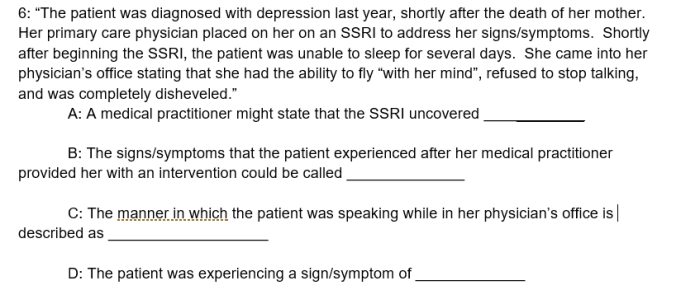When a patient’s mother calls the medical office stating that, it sets the stage for a critical interaction that requires professionalism, empathy, and a commitment to providing optimal patient care. This communication can raise concerns, prompt inquiries, and necessitate decisive actions, making it imperative for healthcare providers to navigate these interactions effectively.
Understanding the nature of the mother’s concerns, responding appropriately, and ensuring effective follow-up are essential aspects of managing these calls. This article delves into the key considerations, guidelines, and best practices for handling such situations, empowering medical professionals to deliver exceptional patient care.
Patient’s Mother’s Concerns: A Patient’s Mother Calls The Medical Office Stating That

The patient’s mother is calling the medical office because she is concerned about her child’s health. She may report symptoms such as fever, cough, or difficulty breathing. She may also express concerns about her child’s behavior, such as lethargy or irritability.
The mother’s concerns may stem from her own observations or from information she has gathered from other sources, such as friends or family members.
The mother’s concerns can have a significant impact on the patient’s health. If the mother is overly concerned, she may seek unnecessary medical care, which can lead to unnecessary tests and procedures. This can be both costly and time-consuming, and it can also expose the child to unnecessary risks.
Medical Office’s Response
When the medical office receives a call from a patient’s mother, the staff should take the following steps:
- Gather information from the mother about the patient’s symptoms and concerns.
- Document the mother’s information in the patient’s medical record.
- Assess the urgency of the situation and determine whether the patient needs to be seen by a doctor.
The staff should be polite and respectful to the mother and should take her concerns seriously. They should also be clear and concise in their communication with the mother.
Follow-Up Actions
The medical office may need to take the following follow-up actions:
- Schedule an appointment for the patient to see a doctor.
- Refer the patient to a specialist.
- Provide the mother with information about the patient’s condition and treatment options.
The medical office should determine the appropriate course of action based on the patient’s condition and the mother’s concerns.
Communication with the Patient

Effective communication with the patient is essential. The medical office staff should convey information to the patient in a clear and understandable manner. They should also be patient and answer the patient’s questions. The staff should build rapport with the patient and establish trust.
Documentation and Record-Keeping

Accurate and complete documentation is essential for the patient’s care. The medical office staff should document the following information in the patient’s medical record:
- The mother’s concerns
- The patient’s symptoms
- The medical office’s assessment of the situation
- The follow-up actions that were taken
The medical office should maintain patient confidentiality and protect the patient’s privacy.
Essential FAQs
What are some common concerns raised by patients’ mothers?
Common concerns include changes in the patient’s behavior, medication side effects, adherence to treatment plans, and overall health status.
How should medical offices document and maintain patient confidentiality?
Accurate and complete documentation should be maintained in the patient’s medical record, adhering to HIPAA guidelines and ensuring the privacy of patient information.
What are the potential follow-up actions that may be necessary?
Follow-up actions may include scheduling appointments, referring patients to specialists, providing additional information or resources, or arranging home visits.